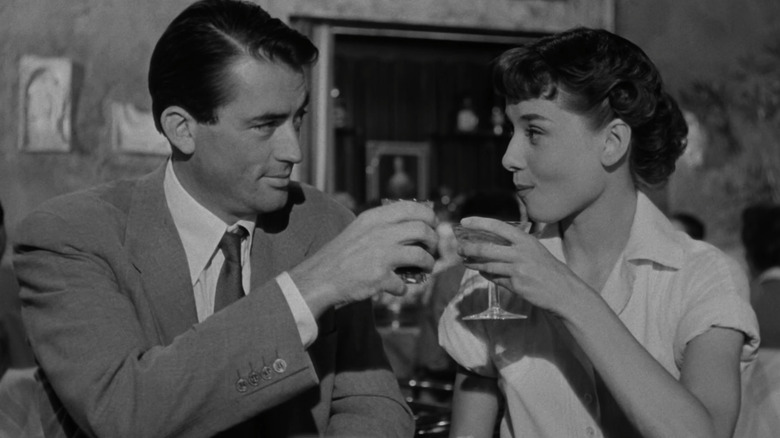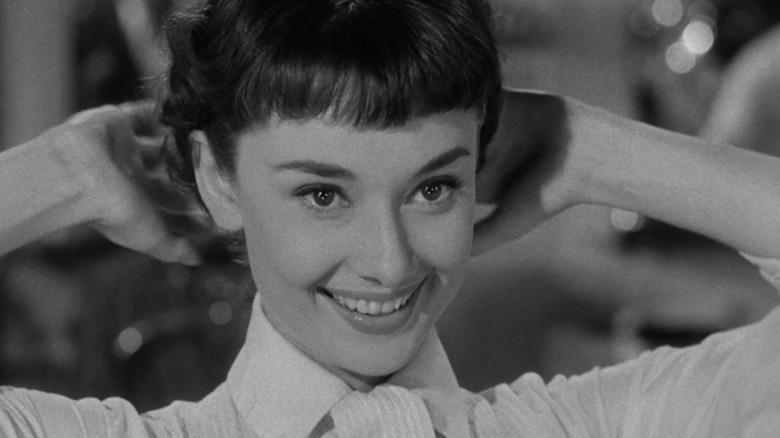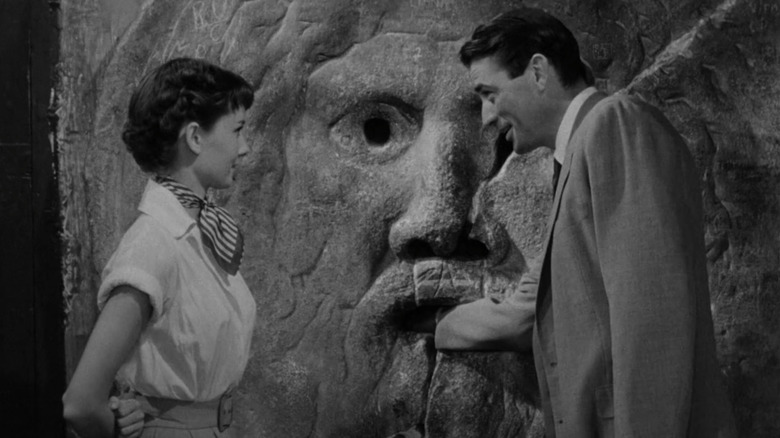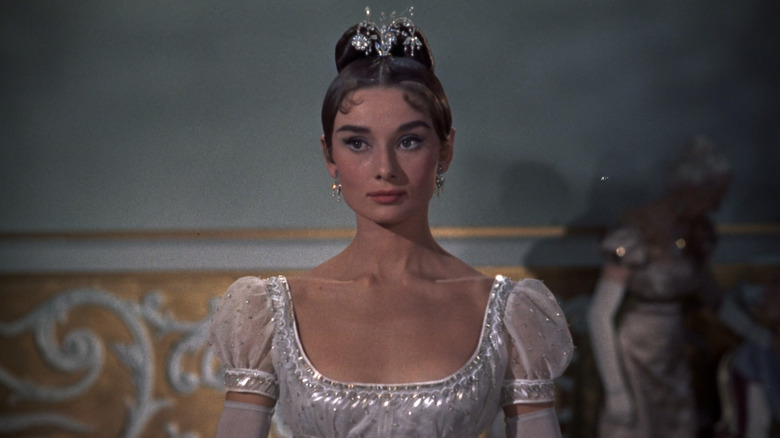How Gregory Peck Fought For Equal Billing For Audrey Hepburn
The "Skip Intro" button is a plague. A film's credits are something I value greatly, whether they are placed into the context of an elaborate title sequence or just superimposed over the movie. Hundreds of people worked incredibly hard to bring you the movie you are about to watch, and the least you could do is acknowledge their efforts. Movie credits alone are important in disproving the notion that the director is responsible for everything you see on screen, and for a long time, many of these people did not receive credit for their work.
On a more fun note, I like to see how the cast of the film is billed. It might seem simple, but so much negotiation goes into determining the order in which actors' names appear on screen: who gets their names above the title, who gets the "with" and "and" credits, who gets single-card billing or is paired with other actors. All of these are fun little surprises for us folks who bother to read the names, and when we get fun things like a "special appearance by," "introducing," or the always appreciated multiple uses of "with" or "and," part of our bizarre brains get a major shot of dopamine.
Sometimes, there's billing where some actors' stature within the films doesn't correspond with commensurate billing prominence. This tends to hit newcomers and rising stars the most because of their relative inexperience. It's how Daisy Ridley ends up fifth-billed in "Star Wars: The Force Awakens," despite being the lead of the picture. One of the biggest stars of all time, Audrey Hepburn, nearly met this same fate in regards to her Oscar-winning, breakout performance in "Roman Holiday." Luckily, she had a co-star in Gregory Peck who fought for her to have billing that actually made sense for her performance.
Finding an unknown star
Though an icon now, Audrey Hepburn wasn't a major Hollywood A-lister when she was cast in William Wyler's sublime romantic comedy "Roman Holiday." In fact, she had never even been in a Hollywood movie before. She wasn't a novice, though. Hepburn was a jobbing actor in the British stage and screen scene with so many others looking to get cast in any part, and she paid her dues like any actor should. However, she quickly rose through the ranks, going from musical ensemble members and few-line bit parts to standout supporting parts to being the lead in just a few short years. What brought her over to the United States was not film, but the original Broadway production of the play "Gigi."
In "Gregory Peck: A Biography," author Gary Fishgall explains that in America, Hepburn earned the attention of Hollywood and William Wyler, in particular, who was so dead set on casting Hepburn in "Roman Holiday" that Paramount ended up having to pay the producers of "Gigi" $50,000 to release her from her contract. "Roman Holiday" proves why he was so determined. It's the kind of luminous, star-making performance that every generation is lucky to just get one of. Nobody in movies at that time was like her, and nobody has been since. She had the ability to be enormously goofy, slyly charming, and confidently naïve all at the same time. Oh, and she just so happened to be maybe the most beautiful person ever photographed on camera. An Academy Award and a Hollywood star career obviously were in her future.
Keep in mind, she did all of this playing opposite someone who had been a major star for about a decade before the release of "Roman Holiday" in Gregory Peck. And he knew full well who he was playing opposite.
Above or below the title
Being above the title for a film is a badge of honor for actors. It shows you have been successful enough to warrant being credited before the title of the movie even appears on screen; your presence is the selling point, not the movie itself. For "Roman Holiday," it was stipulated in Gregory Peck's contract that he was to be the only actor to have their name above the title. This was commonplace for Peck at the time, being a leading man since his entry into Hollywood back in 1944 with "Days of Glory" and his Oscar-nominated turn in "The Keys of the Kingdom."
Though Audrey Hepburn was a co-lead of "Roman Holiday," she wasn't the star Peck was, hence why she was to be billed below the title. However, about halfway through production, Gregory Peck could see what a titanic star she was destined to become in their scenes together, and he thought the billing arrangement was not sufficient for what Hepburn was giving to this movie. As recounted in the biography, Peck called his agent, George Chasin, and demanded that Hepburn also receive above the title billing. Chasin rebuffed and said, "You can't do that. You've worked for years to get top billing." Peck was not going to take that, and responded by saying:
"Oh yes I can. And if I don't, I'm going to make a fool out of myself because this girl is going to win an Oscar in her very first performance."
Peck got his wish, and Audrey Hepburn is indeed billed above the title (though second to Peck, of course). His prediction was also correct: She did win that Oscar. Peck, sadly, didn't even get nominated.
Three more years before being first-billed
Okay. Audrey Hepburn is now a major Oscar-winning movie star. Surely she'll now receive top billing from now on, right? Not exactly. Her next film was Billy Wilder's "Sabrina," a personal favorite. As opposed to "Roman Holiday," where her and Gregory Peck are co-leads with each other, Hepburn is the titular role in "Sabrina." This is her story, from her point of view. If billing were done in accordance with the size of the role, she'd easily be the first name you see in the film's opening credits or on the poster. However, Humphrey Bogart is in "Sabrina." You may not know this, but Bogart is a pretty big deal. Even though his character plays second to Hepburn's Sabrina, he received top billing. She did manage to get billing above William Holden, though, a massive star who won the Best Actor Oscar the same night as Hepburn.
It wasn't until 1956, three years after the release of "Roman Holiday," when Audrey Hepburn was first-billed. This was for Paramount's adaptation of Leo Tolstoy's novel, "War and Peace." Again, she shares above the title billing, this time with Henry Fonda and then-husband Mel Ferrer, but Hepburn gets that prime first position. To be fair, Hepburn was not someone constantly working. These three films were the only three she made in that timespan. I imagine if she had just signed onto whatever was thrown at her, she would have gotten that coveted top spot much sooner. As for when she would be the only name above the title, that wouldn't happen for three more years with Fred Zinnemann's 1959 underrated drama "The Nun's Story."
Ultimately, credit is credit, and the order of names shouldn't really matter. But that being said, the minutiae of billing can be very fun, and we tip our caps to Peck for helping to ensure one of the best movies of the '50s secured a permanent place in that conversation.



